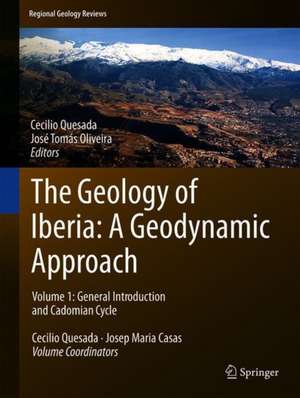The Geology of Iberia: A Geodynamic Approach: Volume 1: General Introduction and Cadomian Cycle: Regional Geology Reviews
Editat de J. Javier Álvaro, Cecilio Quesada, José Tomás Oliveiraen Limba Engleză Hardback – 13 mar 2025
This volume is the only one of the whole series of books composing the Geology of Iberian separated in two parts: Introduction to the Geology of Iberian and the Cadomian Cycle. The first part presents a general introduction to the Geology of Iberian, presented in five different volumes. The second part focuses in the Cadomian orogenic cycle and the oldest geological records in the Iberian Peninsula.
Din seria Regional Geology Reviews
- 15%
 Preț: 651.99 lei
Preț: 651.99 lei - 18%
 Preț: 975.73 lei
Preț: 975.73 lei - 20%
 Preț: 577.79 lei
Preț: 577.79 lei - 18%
 Preț: 802.15 lei
Preț: 802.15 lei - 18%
 Preț: 1126.52 lei
Preț: 1126.52 lei - 24%
 Preț: 775.50 lei
Preț: 775.50 lei - 19%
 Preț: 564.73 lei
Preț: 564.73 lei - 18%
 Preț: 743.11 lei
Preț: 743.11 lei - 18%
 Preț: 1011.14 lei
Preț: 1011.14 lei - 18%
 Preț: 1609.48 lei
Preț: 1609.48 lei - 24%
 Preț: 1039.97 lei
Preț: 1039.97 lei -
 Preț: 316.94 lei
Preț: 316.94 lei - 18%
 Preț: 966.27 lei
Preț: 966.27 lei - 20%
 Preț: 626.67 lei
Preț: 626.67 lei - 20%
 Preț: 598.82 lei
Preț: 598.82 lei - 24%
 Preț: 941.49 lei
Preț: 941.49 lei - 24%
 Preț: 1875.72 lei
Preț: 1875.72 lei - 24%
 Preț: 965.03 lei
Preț: 965.03 lei - 19%
 Preț: 610.00 lei
Preț: 610.00 lei - 24%
 Preț: 1004.92 lei
Preț: 1004.92 lei - 24%
 Preț: 902.69 lei
Preț: 902.69 lei
Preț: 796.89 lei
Preț vechi: 875.70 lei
-9% Nou
Puncte Express: 1195
Preț estimativ în valută:
152.51€ • 158.63$ • 125.90£
152.51€ • 158.63$ • 125.90£
Carte nepublicată încă
Doresc să fiu notificat când acest titlu va fi disponibil:
Se trimite...
Preluare comenzi: 021 569.72.76
Specificații
ISBN-13: 9783030103972
ISBN-10: 3030103978
Pagini: 380
Ilustrații: VIII, 382 p. 110 illus., 50 illus. in color.
Dimensiuni: 210 x 279 mm
Ediția:1st ed. 2024
Editura: Springer International Publishing
Colecția Springer
Seria Regional Geology Reviews
Locul publicării:Cham, Switzerland
ISBN-10: 3030103978
Pagini: 380
Ilustrații: VIII, 382 p. 110 illus., 50 illus. in color.
Dimensiuni: 210 x 279 mm
Ediția:1st ed. 2024
Editura: Springer International Publishing
Colecția Springer
Seria Regional Geology Reviews
Locul publicării:Cham, Switzerland
Cuprins
1. the Geology of Iberia: An Introduction.- 2. The Cadomian Cycle.- Precambrian Basement.- 3.Variscan Cycle.- 4.Alpine Cycle.- 5. Cenozoic Basins.- 6. Lithospheric Structure of Iberia, the Balearic Islands and the Continental Shelves.- 7.Relief and Active Processes.
Textul de pe ultima copertă
Pursuing a new global approach, this unique book provides an updated review of the geology of Iberia and its continental margins from a geodynamic perspective. Owing to its location close to successive plate margins, Iberia has played a pivotal role in the geodynamic evolution of the Gondwanan, Rheic, Pangea, Tethys s.l. and Eurasian plates over the last 600 Ma of Earth’s history. The geological record begins with the amalgamation of Gondwana in the Neoproterozoic, followed by the rifting and spread of the Rheic ocean; its demise, which led to the amalgamation of Pangea in the late Paleozoic; the rifting and spread of several arms of the Neotethys ocean in the Mesozoic Era; and concludes with their ongoing closure, which was responsible for the Alpine orogeny. The significant advances made in the past 20 years have attracted considerable international research interest in the geology of the Iberian Peninsula.
This volume is the only one of the whole series of books composing the Geology of Iberian separated in two parts: Introduction to the Geology of Iberian and the Cadomian Cycle. The first part presents a general introduction to the Geology of Iberian, presented in five different volumes. The second part focuses in the Cadomian orogenic cycle and the oldest geological records in the Iberian Peninsula.
This volume is the only one of the whole series of books composing the Geology of Iberian separated in two parts: Introduction to the Geology of Iberian and the Cadomian Cycle. The first part presents a general introduction to the Geology of Iberian, presented in five different volumes. The second part focuses in the Cadomian orogenic cycle and the oldest geological records in the Iberian Peninsula.
Caracteristici
Enriches readers’ understanding of the evolution of the Iberian microplate over the past 600 million years Reviews key recent advances concerning the geology of the Iberian Peninsula from a geodynamic perspective Summarizes the latest studies on the record of the Cadomian, Variscan, and Alpine orogenies in Iberia
